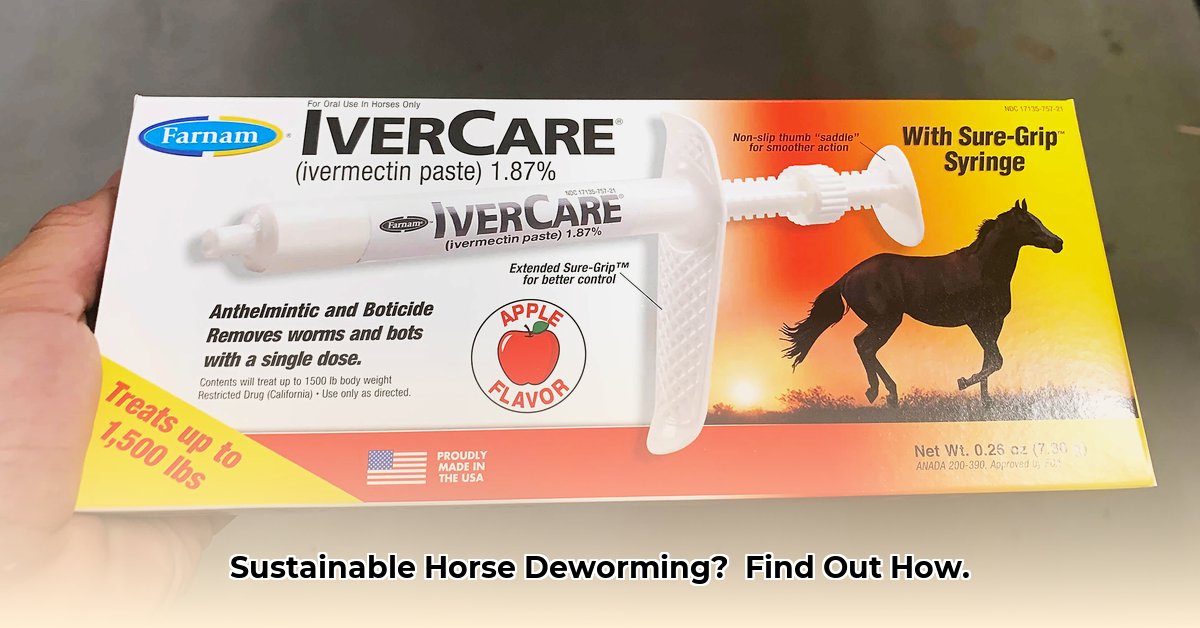
Keeping your horse healthy involves managing internal parasites. Worms can significantly impact your horse's energy levels, weight, and overall well-being. This guide explains how to use Tractor Supply's horse wormer effectively and responsibly, focusing on sustainable practices for both your horse and the environment. For more information on pet supplies from Tractor Supply, check out this helpful resource.
Understanding Equine Parasites
Several parasites can infest horses, including strongyles (roundworms), tapeworms, and ascarids. These parasites live in your horse's digestive tract, absorbing nutrients and causing various health problems. Symptoms can include weight loss, dull coat, lethargy, colic, and diarrhea. Early detection and treatment are vital. Don't hesitate to consult your veterinarian if you suspect parasite infestation.
Choosing and Using Tractor Supply Horse Wormer
Tractor Supply offers a range of horse wormers. Selecting the right product depends on your horse's age, weight, and the specific parasites present. Always carefully read the product label for dosage instructions and targeted parasites. If you're unsure which product is best, consult with a Tractor Supply associate or your veterinarian. They can provide tailored recommendations considering your horse's individual needs.
Safe and Effective Deworming: A Step-by-Step Guide
Accurate dosage is crucial for effective deworming. Always follow the instructions on the product label precisely.
Step-by-Step Instructions:
- Weigh Your Horse: Accurately weigh your horse using a reliable scale.
- Determine Dosage: Use the weight chart provided on the wormer's label to calculate the correct dose for your horse's weight. Double-check your calculations.
- Prepare the Medication: Follow the label's instructions for mixing the medication (if necessary) with feed or water.
- Administer the Medication: If mixing with feed, ensure your horse consumes the entire dose. For direct administration, gently use a syringe to place the wormer in the back of your horse's mouth, avoiding the nostrils.
- Monitor Your Horse: Observe your horse after administration for any unusual behavior or changes in their manure. Contact your veterinarian if you notice any significant issues, such as severe diarrhea or colic.
Sustainable Deworming Practices
Sustainable horse management goes beyond simply using a wormer. It involves minimizing parasite problems in an environmentally responsible way:
- Regular Fecal Egg Counts (FECs): FECs accurately determine the number of parasite eggs in your horse's manure. This helps to determine if deworming is truly necessary, avoiding unnecessary medication use.
- Targeted Deworming: Only deworm horses with high parasite loads as indicated by FECs. This strategy minimizes the development of parasite resistance to medication.
- Strategic Pasture Management: Implement rotational grazing and rest periods to interrupt the parasite life cycle in pastures.
- Manure Management: Properly manage manure to prevent parasite spread. Composting manure effectively reduces parasite viability.
Potential Side Effects and Troubleshooting
While generally safe, some horses may experience mild side effects like temporary diarrhea or reduced appetite. These are usually not severe, but if you observe any significant issues, contact your veterinarian immediately. Store the wormer according to the label instructions.
Frequently Asked Questions (FAQs)
- Q: How often should I deworm? A: Frequency depends on your horse's individual needs and FEC results. Regular FECs are the key to determining the appropriate deworming schedule.
- Q: What if I give the wrong dose? A: Contact your veterinarian immediately for guidance.
- Q: Can I switch between wormers? A: It's best to stick with one product unless your veterinarian advises otherwise.
Responsible deworming is crucial for your horse's health and overall pasture sustainability. By combining strategic deworming with proactive pasture management, you contribute to a healthier horse and a healthier environment. Remember that regular FECs are an essential part of this sustainable approach.